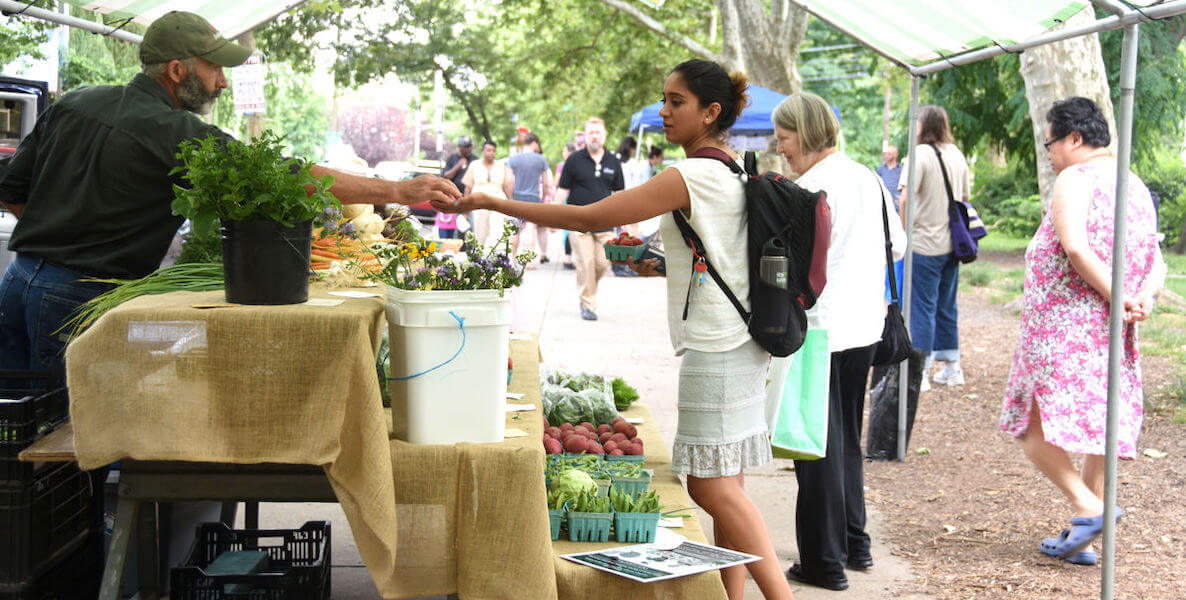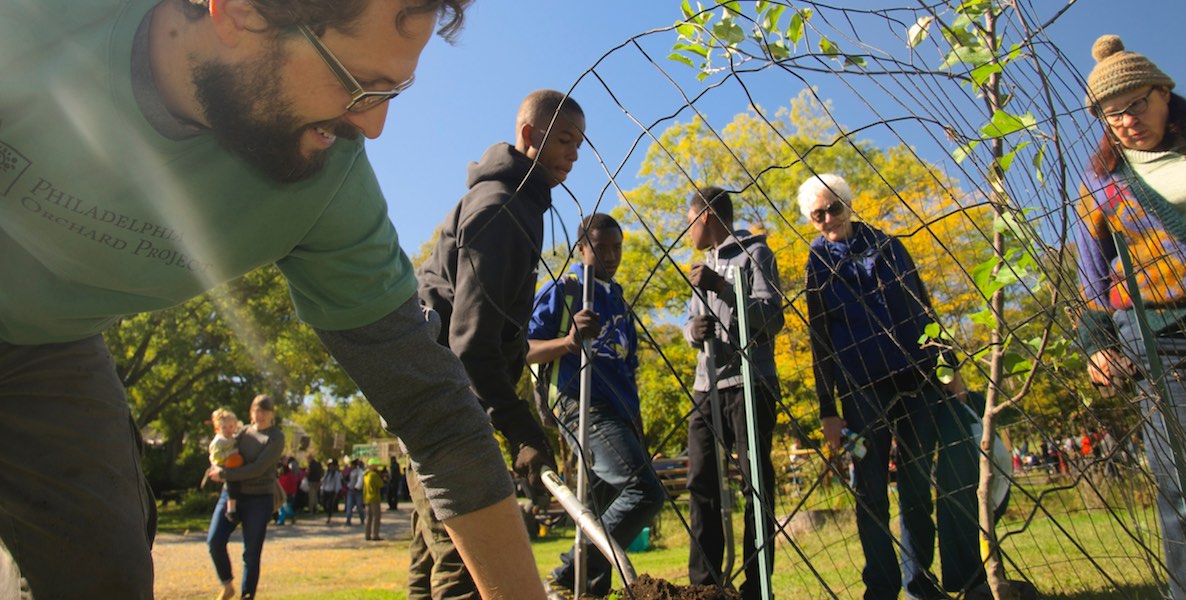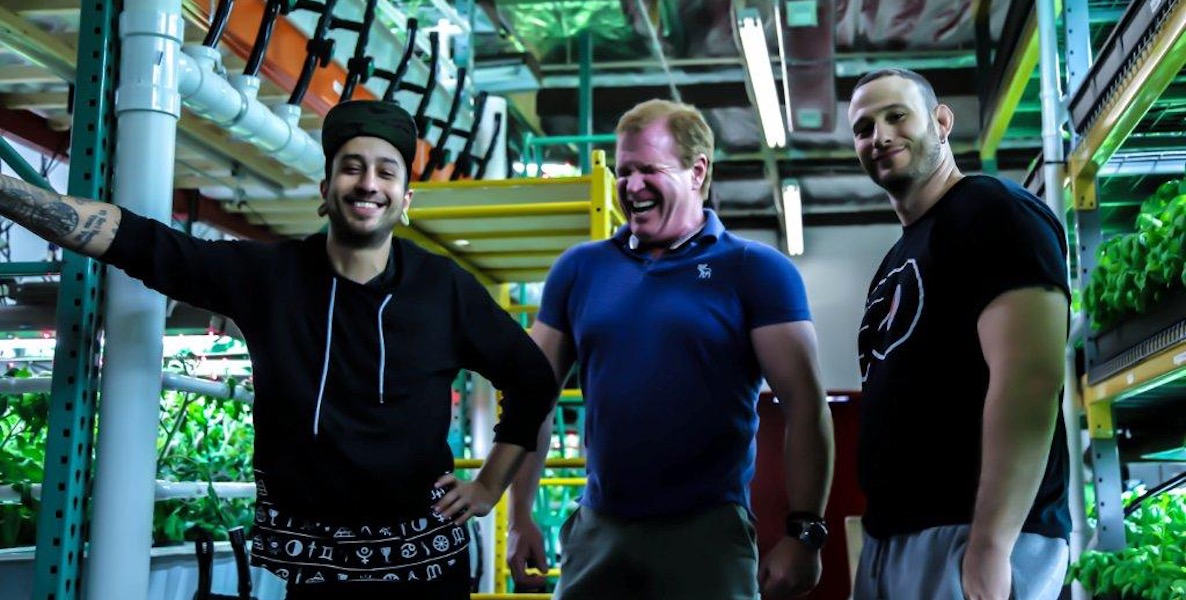If you’re a wide-eyed urbanist, you may have seen the online mockups of towering Jetson-esque pod-farms drafted up as a template for vertical farming, possessing as much space as skyscrapers, with mighty oaks exploding toward the sun 500 feet from the ground. A darling notion, but that ain’t what’s happening, at least not yet: Metropolis Farms, Philly’s only vertical farming outfit, sits in a low, unassuming building in South Philly, not far from Tony Luke’s or IKEA.
But it could be the seed of something huge.
![]() “We’re looking to completely change the system,” says Jack Griffin. Griffin is the president of Metropolis Farms. As it stands, Metropolis is one of only a handful of vertical farms in the U.S., and the first certified-vegan vertical farming outfit in the country.
“We’re looking to completely change the system,” says Jack Griffin. Griffin is the president of Metropolis Farms. As it stands, Metropolis is one of only a handful of vertical farms in the U.S., and the first certified-vegan vertical farming outfit in the country.
Griffin, a former merchant banker originally from Philadelphia, says that he has been obsessed with the concept of vertical farming for years, ever since turning down a vertical farming outfit for a loan several years ago. He opened Metropolis Farms after two years of planning, research and development last February. Although his outfit currently employs fewer than 10 people, he plans to grow his staff to around 100 by the end of 2017 with coming business expansions. Griffin says that he’s already turning a profit in his vertical farming business, but that’s nearly beside the point: The man has big plans for the future of the exploding industry.
Griffin sees Philadelphia not only as the home base for Metropolis Farms, but as its international hub: R&D will be conducted in Philadelphia; people will come from around the world to train as vertical farmers here; nearly the entirety of the manufacturing will be done in Philadelphia.
Farmers around the world are utilizing new techniques to grow larger crops in more challenging environments than in the past. Israeli farmers have pioneered growing crops from the desert; California farmers are looking to the ancients for ways to solve their water woes; community farming in U.S. cities has exploded in recent years. With good reason: Our population is growing at a massive clip, with an estimated 10 billion people due to be on the planet by 2050. Keeping all of us fed is going to be one of our biggest challenges—especially when arable land is being gobbled up by drought and desertification, and climate change is having an increasingly brutal effect on U.S. crops. And cities, which people are gravitating toward at a nearly unprecedented rate, lack virtually any agricultural infrastructure.
In response, Metropolis is attempting to pioneer modular vertical farming apparati, to be manufactured in Philadelphia. Griffin says that one of his modular vertical farming towers would cost somewhere between $16,000 and $17,000, and that a full array of 30 would cost around $500,000. Compare that to, say, the Aerofarms indoor farming project in Newark, N.J., the premier vertical farming installation on the east coast, which cost $30 million to build.
Griffin says that he’s “sitting on at least $10 million” in potential contracts for his vertical farming system, and that he’s drawn interest from investors as far away as Moscow.
That’s because vertical farming, if done right, is a no-brainer of a civic investment. The process requires considerably less energy than traditional farming. There is no heavy equipment involved; no backhoe or tractor fleet is needed. The most dramatic up-front cost is the lighting and rigging.

Vertical farms are indoors, which means farmers can create perfect growing conditions, letting them grow crops all year, and harvest at a faster rate than traditional farms. A properly sterile environment is also immune to bugs and diseases that plague traditional crops, so there’s no need for pesticides and germicides.
What’s more: Locally sourcing your food means significantly lower transportation costs. Transportation costs are a main driver behind the high price of produce, and the length of the transportation process can severely diminish a product’s shelf life. If the number of high-volume vertical farms increased dramatically in cities, it would obviate the need to cart produce in from far and wide; hypothetically, you could U-Haul the crop from South Philly to the Trader Joe’s in Center City (or Whole Foods, which Metropolis Farms currently supplies).
“Instead of being a customer, we have to become our own supplier,” says Griffin of Philadelphia. “That way, we can keep our money moving within our own city.”
Investors are clamoring to get in on all that vertical action, with the market for vertical farming expected to expand to roughly $3.9 billion by 2020. That’s a lot of green for a lot of green.
So vertical farming may yet save the world and make a bonzer profit. But what can it do for Philly, the poorest big city in the country? The U.S. Department of Agriculture estimates that 11 percent of households in Philadelphia are food insecure; according to the Hunger Coalition, one in four people in Philadelphia is at risk for hunger. “The problem is food access,” says Griffin.
Griffin says that one of his modular vertical farming towers would cost somewhere between $16,000 and $17,000, and that a full array of 30 would cost around $500,000. Compare that to, say, the Aerofarms indoor farming project in Newark, N.J., the premier vertical farming installation on the east coast, which cost $30 million to build.
Metropolis Farms has a plan to battle malnutrition and hunger in a novel way, even before vertical farming becomes commonplace. Griffin has set up a nonprofit, called Grandma’s—a name that he got from a friend—and says he is in the process of negotiating with SEPTA to donate two busses. The buses are going to be converted into “mobile markets” for vegan meals, and deployed into low-income areas—including his old neighborhood in North Philly. “We’re going to develop low-cost, highly-nutritious—but they also have to be really tasty—meals. No one wants to survive on McDonald’s hamburgers, but when that’s all that’s around, that’s all you buy,” he says.
Grandma’s will accept SNAP benefits, and Griffin’s goal is for the meals to cost less than your average fast food meal. He says that he’s already talking with “top chefs” in Philly about the project. But that’s only the short-term play to share the profits of the vertical farming revolution with Philly.
![]() Metropolis Farms wants to keep vertical farming development in Philly. Griffin sees Philadelphia not only as the home base for Metropolis Farms, but as its international hub: If Griffin gets his wish, R&D will be conducted in Philadelphia, assisted by the biggest brains from Penn, Villanova, and Drexel; people will come from around the world to train as vertical farmers in Philadelphia; nearly the entirety of the manufacturing of Metropolis Farms’ modular vertical farming product will be done in Philadelphia.
Metropolis Farms wants to keep vertical farming development in Philly. Griffin sees Philadelphia not only as the home base for Metropolis Farms, but as its international hub: If Griffin gets his wish, R&D will be conducted in Philadelphia, assisted by the biggest brains from Penn, Villanova, and Drexel; people will come from around the world to train as vertical farmers in Philadelphia; nearly the entirety of the manufacturing of Metropolis Farms’ modular vertical farming product will be done in Philadelphia.
Ultimately, Griffin hopes, Philadelphia will be able to maintain a self-sustaining, local agricultural system and be able to supply low-income citizens with high-quality, low price fruits and vegetables as a result.
That’s still a ways off. For now, Griffin says the focus is on making vertical farming profitable and available to investors, as well as improving the product.
“We’re making it so that maybe, in the future, some kid will be able to develop those skyscrapers with oak trees shooting out of them,” he says.
Header photo by Jason Sherman for Metropolis Farms






